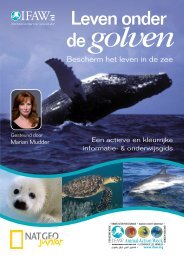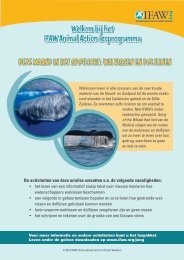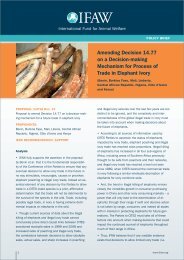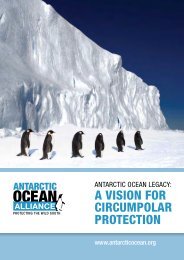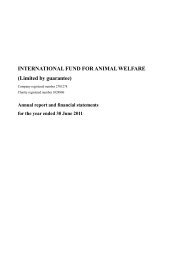leagal aspects of the whale watching.pdf - International Fund for ...
leagal aspects of the whale watching.pdf - International Fund for ...
leagal aspects of the whale watching.pdf - International Fund for ...
You also want an ePaper? Increase the reach of your titles
YUMPU automatically turns print PDFs into web optimized ePapers that Google loves.
It was determined that generally, a special marine protected area includes:<br />
• delimitation <strong>of</strong> <strong>the</strong> boundary <strong>of</strong> <strong>the</strong> area<br />
• a special management regime applied to <strong>the</strong> area<br />
• an environmental protection orientation<br />
Domestic legislation and international agreements can both be used to create special marine protected areas.<br />
However, <strong>the</strong> several different legal regimes <strong>for</strong> <strong>the</strong> eight jurisdictional zones established by <strong>the</strong> 1982 United Nations<br />
Convention on <strong>the</strong> Law <strong>of</strong> <strong>the</strong> Sea (UNCLOS) must be taken into account when establishing such areas; in particular<br />
<strong>the</strong> 12 nautical mile territorial sea, <strong>the</strong> 200 nautical mile Exclusive Economic Zone (EEZ), and <strong>the</strong> high seas. In<br />
internal waters, <strong>whale</strong> <strong>watching</strong> falls wholly within <strong>the</strong> sovereignty <strong>of</strong> <strong>the</strong> coastal state, as it does also in <strong>the</strong><br />
territorial sea, although third states enjoy a right <strong>of</strong> innocent passage in <strong>the</strong> latter. In <strong>the</strong> EEZ, <strong>whale</strong> <strong>watching</strong> can<br />
also be regulated by <strong>the</strong> coastal state, as <strong>the</strong> coastal state has sovereign rights to explore, exploit, conserve and<br />
manage its natural resources, and under Article 65 <strong>of</strong> UNCLOS, in <strong>the</strong> case <strong>of</strong> marine mammals, to prohibit or<br />
regulate <strong>the</strong>ir exploitation as appropriate more strictly than o<strong>the</strong>r marine species. The coastal state must also<br />
con<strong>for</strong>m to various o<strong>the</strong>r requirements <strong>of</strong> UNCLOS concerning both conservation and protection <strong>of</strong> <strong>the</strong> marine<br />
environment. It is unclear to what extent a coastal state can control navigation which might interfere with <strong>whale</strong><br />
<strong>watching</strong> in <strong>the</strong> EEZ.<br />
Special marine protected areas may be established under various international and regional agreements <strong>for</strong> a variety<br />
<strong>of</strong> purposes. The Sou<strong>the</strong>rn Ocean and Indian Ocean sanctuaries, were both established by <strong>the</strong> IWC by amendment<br />
<strong>of</strong> <strong>the</strong> Schedule to <strong>the</strong> ICRW, as provided <strong>for</strong> in Article V <strong>of</strong> <strong>the</strong> latter. Examples <strong>of</strong> various types <strong>of</strong> special areas and<br />
sanctuaries were discussed, including <strong>the</strong> special problems related to <strong>the</strong> creation <strong>of</strong> <strong>the</strong> most recent sanctuary in<br />
<strong>the</strong> Mediterranean which makes specific provisions <strong>for</strong> <strong>whale</strong> <strong>watching</strong>.<br />
It was noted that states could be encouraged in <strong>the</strong> light <strong>of</strong> Article 65 <strong>of</strong> UNCLOS, which is also made applicable to<br />
<strong>the</strong> high seas by Article 120, to establish special marine protected areas <strong>for</strong> <strong>the</strong> conservation <strong>of</strong> <strong>whale</strong>s both within<br />
and beyond areas <strong>of</strong> national jurisdiction. Article 65 not only requires states to cooperate with a view to <strong>the</strong><br />
conservation <strong>of</strong> marine mammals but, in <strong>the</strong> case <strong>of</strong> cetaceans in particular, to work through <strong>the</strong> appropriate<br />
international organisations <strong>for</strong> <strong>the</strong>ir conservation, management and study.<br />
The Mediterranean<br />
In <strong>the</strong> Mediterranean, states have, so far, preferred to “absent” <strong>the</strong>mselves from <strong>the</strong> sea areas beyond <strong>the</strong> 12<br />
nautical mile territorial sea, as surrounding states are so closely related geographically that EEZs, if <strong>the</strong>y claimed<br />
<strong>the</strong>m, would overlap significantly, causing maritime boundary problems. Four countries do, however, claim fishing<br />
rights beyond <strong>the</strong>ir 12 nautical mile territorial zone in this area.<br />
An area (comprised mainly <strong>of</strong> “high seas”) situated between Italy, France, Corsica and Sardinia (see map 1) has been<br />
proposed as a sanctuary <strong>for</strong> marine mammals. To this end, a joint, non-binding declaration was recently agreed<br />
upon by France, Italy and Monaco, which should lead to <strong>the</strong> conclusion <strong>of</strong> a trilateral treaty providing <strong>for</strong> <strong>the</strong><br />
establishment <strong>of</strong> a management authority. This declaration prohibits <strong>the</strong> use <strong>of</strong> drift-nets and demands that <strong>whale</strong><br />
<strong>watching</strong> <strong>for</strong> tourism should be regulated within <strong>the</strong> sanctuary. However, even if <strong>the</strong> declaration were to be made<br />
binding, it would not give <strong>the</strong> contracting parties authority over vessels on <strong>the</strong> high seas flying <strong>the</strong> flags <strong>of</strong> nonparties<br />
to it.<br />
9









